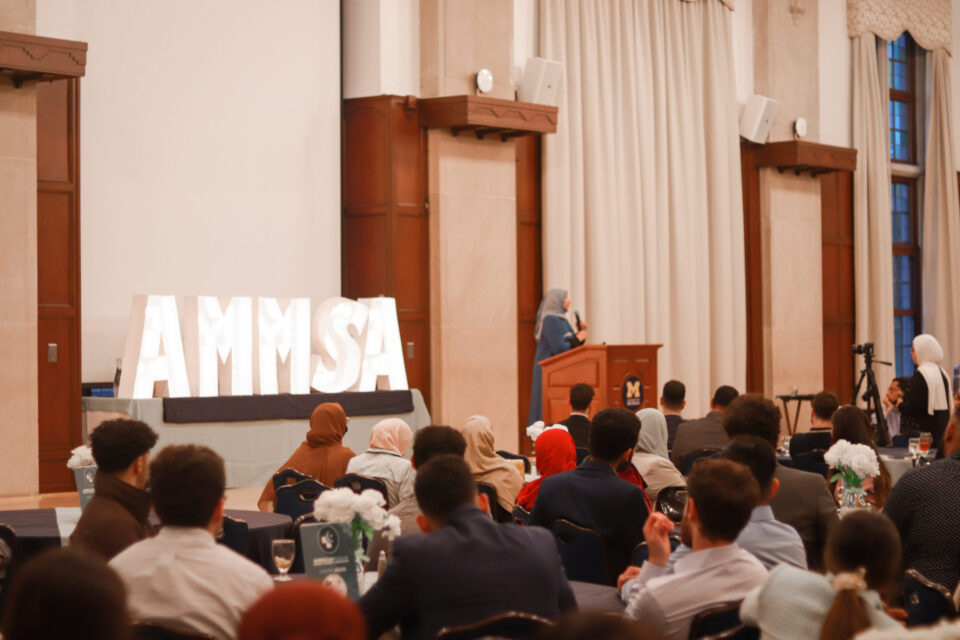“In the name of God, the most beneficent, the most merciful,” the speaker said gently as she looked over the hundreds of students facing her with attention. The crowd was used to hearing this phrase spoken before Friday sermons and other religious gatherings. However, this time, the words were said as an introduction to a talk about healthcare systems. A murmur of excitement was felt across the crowd. As for the many Muslim medical students in attendance, this was the first time they heard God’s name mentioned before a talk related to their profession. Finally, the connection between their faith and commitment to professional excellence was actualized. The first-ever American Muslim Medical Student Association (AMMSA) conference proceeded for another two days with talks on discrimination, entrepreneurship, service, and more. All the talks, connected by a foundation of spirituality, were separated by scheduled prayers in which the large mass of students stood shoulder to shoulder in remembrance of God.
The journey to this first-of-its-kind gathering did not occur overnight. For many Muslim medical students, faith serves as a foundation for lifelong moral development and spirituality, and it plays an instrumental role in one’s decision to pursue careers in medicine. About 4.5% of the total physician workforce in the United States are Muslim international medical graduates, with many more having received their medical education domestically. However, amidst the stress and rigors of medical school and limited in-person activities during the COVID-19 era, many Muslim medical students find faith absent within their training and medical school communities. This realization came to a head at the start of our clerkship rotations, in which the founders of AMMSA faced the reality of patient care, including pain and death, without a spiritual outlet to process these formative experiences. The leaders of AMMSA spoke to Muslim medical students across the country and recognized that many other aspiring physicians experienced this gap between faith, medical education, and their future careers. This was the inspiration behind AMMSA — a platform to bridge students’ professional pursuits with the spiritual background that drives them. AMMSA serves as a professional and personal resource rooted in students’ spiritual foundation. Through online webinars, workshops and mentorship programs, AMMSA provides a system for long-term success for Muslim students through community support and professional development, underpinned by continuous spiritual growth. We achieved significant turnouts to our events during Ramadan 2022, a time when COVID-19 restrictions had started to lift and many students were yearning for community. In major cities across the United States, students from various medical schools joined together to break bread and develop bonds of friendship. Looking around packed banquet halls from Philadelphia to San Francisco, we felt an overwhelming joy at the sight of Muslim medical students from all types of backgrounds coming together to break their fast and build relationships that will last a lifetime.
However, the greatest demonstration of medical students’ desire for more spiritual fulfillment in their academic lives came during the first annual AMMSA conference. The conference attracted more than 300 students from 30 medical schools. 63% of the attendees were female, 25% went to Doctor of Osteopathic (DO) medical schools, 70% traveled from outside the Midwest, and 25% hailed from communities underrepresented in medicine. A post-conference survey revealed 81% of attendees desired opportunities to explore the intersectionality between spirituality and medicine, and 76% said they do not have opportunities for it in their standard medical education. The success of this conference and our organizations is a testament to Muslim students’ desire to achieve more spiritual fulfillment during their academic journeys and develop personal identities alongside our professional ones that foster increased authenticity and invested healthcare providers to patients overall.
As we proceed through the rigors of medical school, the experiences and relationships built at AMMSA meetings continue to be our most cherished memories. Through the opportunities presented by AMMSA, we met mentors and colleagues that inspired us, related with topics that grounded our ambitions and found a community that we connected with on a deep level. No longer do we feel isolated finding time to fulfill our five obligatory prayers during hectic clinical rotations or balancing studies and worship while fasting during the holy month of Ramadan. By investing in the formation of our professional and personal identities, we, in turn, become more holistic physicians.
Image credit: Photography, taken on April 12, 2022, provided by the authors for this Mosaic in Medicine piece.

